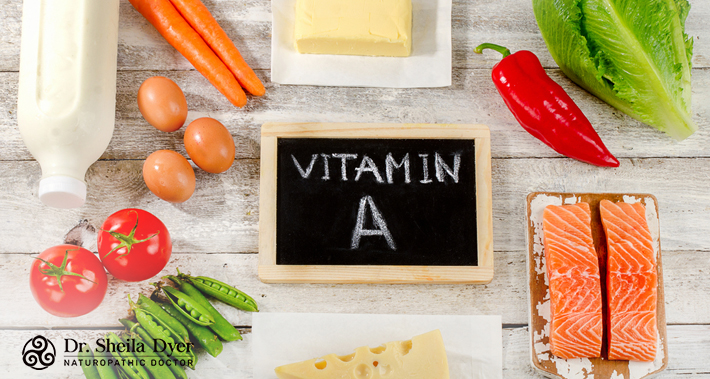Do you want a healthy immune system?
Want to keep your skin and eyes healthy?
If so, make sure you’re getting enough vitamin A.
As a naturopath for skin conditions, I frequently work with people who have a wide variety of different skin issues, and vitamin A is a frequent ally in helping people achieve healthier skin naturally.
So, let’s talk about vitamin A – what it is, what its benefits are, and how you can get the most of it.
This is the next in a series of the various nutrients that keep us healthy – take a look below for some of the other essential nutrients you need.
Let’s Talk About Vitamin B1
Let’s Talk About Vitamin B2
Let’s Talk About Vitamin B3
Let’s Talk About Vitamin B5
Let’s Talk About Vitamin B6
Let’s Talk About Vitamin B7
Let’s Talk About Vitamin B9
Let’s Talk About Vitamin B12
Let’s Talk About Vitamin C
Let’s Talk About Vitamin D
Let’s Talk About Vitamin E
Let’s Talk About Fat
Let’s Talk About Fibre
Let’s Talk About Potassium
Let’s Talk About Zinc
What Is Vitamin A?
Vitamin A is the name for a group of fat soluble compounds that include retinol, retinal, and retinyl esters.
Fat soluble means that it is stored in your tissues for later use, as opposed to water soluble vitamins, which are either used immediately or flushed out in your urine.
Your liver stores most of the vitamin A in your body.
Retinol and retinyl esters are considered “preformed vitamin A” – these are only found in animal products.
On the other hand, provitamin A carotenoids are another form, which you can only get from plant based foods.
Either way, your body has to convert them into retinal and retinoic acid, which it can actually use.
Benefits Of Vitamin A
Vitamin A is an essential vitamin that offers many benefits for your body.
Keep reading to find out more about how vitamin A can support your overall health goals.
1. It Helps Keep Your Skin Healthy
Vitamin A helps to keep your skin healthy, and helps to maintain your surface tissues including your skin, intestines, lungs, bladder, and inner ear.
RELATED: Gut Health Naturopath Near Me
A deficiency may increase your risk of developing acne because it causes an overproduction of the protein keratin in your hair follicles.
This can make it more difficult for dead skin cells to be removed from your hair follicle, which leads to a blockage and can trigger acne.
Vitamin A based skincare products and medications for acne are now widely available and used.
As a naturopathic doctor in Toronto, I frequently recommend vitamin A as part of a naturopathic acne treatment
2. It Helps Keep Your Eyes Healthy
Vitamin A supports your vision and eye health.
In the form of retinal, it combines with the protein opsin to form rhodopsin, which is a molecule required for low light and colour vision.
It also protects your cornea and your conjunctiva, two very important parts of your eye, by lowering levels of oxidative stress.
By maintaining these areas, it helps to prevent macular degeneration, which is a leading cause of vision loss.
One of the first symptoms of vitamin A deficiency is nyctalopia, also known as night blindness.
This happens because rhodopsin, the molecule required for low light or night vision, relies on vitamin A to form it.
3. It Supports Your Immune Systems
Vitamin A supports your immune system by its role in the growth and distribution of T cells and B cells.
Both of these cells are necessary for your immune responses that protect your body from infection or disease.
A deficiency can lead to increased levels of inflammatory molecules, which can diminish your immune response and function.
RELATED: Autoimmune Disease Naturopathic Treatment Near Me
4. It’s Good For Your Bones
Vitamin A is a key ingredient required for the maintenance of your bones as you age.
Along with calcium and vitamin D, vitamin A plays an important role in your bone growth and bone development.
A deficiency can put you at a greater risk of bone fractures, and is generally linked to poor bone health.
5. It Has Anti Cancer Properties
Last, but not least, vitamin A has anti cancer properties due to it being a potent antioxidant.
Antioxidants protect your body from highly reactive molecules, called free radicals, which can harm your body by creating oxidative stress.
Oxidative stress has been linked with cancer, and so minimizing this is key to help reduce your risk.
This 2016 study shows it may lower your risk of cervical cancer.
Another 2016 study shows dietary vitamin A, beta carotene, and lycopene may lower your risk of pancreatic cancer.
Finally, this 2014 meta analysis of 25 previous studies shows that retinoids may inhibit the growth of bladder cancer cells.
Symptoms Of Vitamin A Deficiency
We’ve talked about all of the benefits of vitamin A for your body.
But how do you know if you’re deficient in it?
The good news is that vitamin A deficiency is rare in most developed countries, including Canada.
It is more common in countries that have limited access to food sources of preformed vitamin A and provitamin A carotenoids for their population.
Vitamin A deficiency can cause severe symptoms, however, and is one of the leading causes of preventable blindness in children.
It can also weaken your immune system and increase your risk of dying from infections like diarrhea or measles.
Vitamin A deficiency can also cause skin challenges like hyperkeratosis and acne.
You may also be at a higher risk of vitamin A deficiency if you have cystic fibrosis, or are pregnant or breastfeeding.
Dietary Sources Of Vitamin A
There are many different dietary sources of vitamin A.
You can find both preformed vitamin A in animal products and provitamin A carotenoids from plant based sources.
Your body absorbs preformed vitamin A easier, so if you’re vegan, it’s important to make sure you’re getting appropriate amounts of carotenoid rich foods.
You can find abundantly preformed vitamin A in:
- Beef liver
- Egg yolks
- Butter
- Cod liver oil
- Liverwurst
- Salmon
- Chicken liver
- Cheddar cheese
- King mackerel
- Trout
You can find high amounts of provitamin A carotenoids in:
- Pumpkin
- Sweet potatoes
- Kale
- Carrots
- Spinach
- Dandelion greens
- Winter squash
- Papaya
- Collard greens
- Red peppers
Can You Overdose On Vitamin A?
Vitamin A is an essential nutrient, but it is possible to have too much of a good thing.
Some common side effects of hypervitaminosis A, or chronic vitamin A toxicity include:
- Joint and bone pain
- Vision disturbances
- Poor appetite
- Nausea and vomiting
- Sunlight sensitivity
- Hair loss
- Headaches
- Dry and itchy skin
- Liver damage
- Confusion
You can also have acute vitamin A toxicity, which has severe symptoms like liver damage, increased cranial pressure, and can even result in death.
However, it’s very difficult to get too much vitamin A through diet alone.
That’s why if you’re planning on supplementing with vitamin A, it’s important to speak with a nutritional counseling naturopath to make sure you’re not doing damage without realizing.
Speaking of which…
Book Your Appointment With Dr. Sheila Dyer, ND, Today
Vitamin A is an important vitamin your body needs.
It’s important to make sure you get enough, but not too much.
This is especially the case if you’re vegan, because you’ll want to make sure you’re getting enough from your dietary sources.
If you’re looking for naturopathic medicine to support you and your health goals, I’m Dr. Sheila Dyer, ND, and I can help.
Book your appointment with me, Dr. Sheila Dyer, ND, today.
If you have questions about naturopathic medicine, or would like to start with your first consultation, contact me, and let’s book an appointment.
Dr. Sheila Dyer, ND1080 Dovercourt Rd,
Toronto, ON M6H 2X8
(416) 554-5135
► https://g.page/DrSheilaDyerNd
Dr. Sheila Dyer is a Naturopathic Doctor and a practicing registered nurse offering holistic healthcare with a scientific focus

